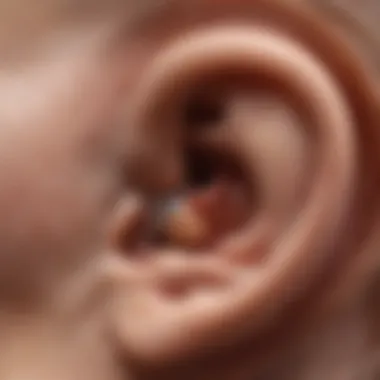The Role of Vitamin D in Managing Vertigo Symptoms


Intro
Vitamin D, often referred to as the "sunshine vitamin," plays a crucial role in various physiological processes within the body. Beyond its well-known functions related to bone health and immune system support, emerging research highlights its potential influence on vestibular function. This is of particular interest for individuals experiencing vertigo, a condition characterized by a false sense of spinning or motion. The exploration of the relationship between vitamin D levels and vertigo symptoms is vital for understanding potential management strategies for those affected by this often-debilitating condition.
Research Highlights
Overview of Key Findings
Recent studies suggest that adequate levels of vitamin D might positively impact vestibular function. Research indicates that vitamin D deficiency could contribute to neurodegenerative conditions, which may exacerbate symptoms of vertigo. Some key findings include:
- Vitamin D Receptors: Found in the inner ear, they play a role in vestibular health.
- Calcium Homeostasis: Vitamin D aids in maintaining calcium levels, essential for proper nerve function.
- Inflammatory Response: Vitamin D has been shown to regulate inflammation, which may influence vestibular disorders.
The connection between vitamin D and vertigo presents compelling evidence that supplementation could potentially alleviate symptoms for those who are deficient.
Significance of the Research
Understanding the role of vitamin D in managing vertigo is significant for several reasons. First, it opens the door to non-invasive treatment options that could enhance quality of life for many. Additionally, as many individuals are unaware of their vitamin D levels, this research highlights the importance of routine assessments, particularly for populations at risk of deficiency, such as the elderly and those with limited sun exposure.
Original Research Articles
Summary of the Article
Several studies propose a link between vitamin D deficiency and vestibular disorders. These articles rigorously analyze the physiological mechanisms underlying this relationship. They discuss how vitamin D influences calcium absorption and its implications on the auditory and vestibular systems, laying the groundwork for further exploration in clinical settings.
Author Contributions
The authors involved in the research collectively provide unique insights into the influence of vitamin D on vertigo symptoms. Their backgrounds in neurology, otology, and nutrition enhance the multidisciplinary understanding of this topic. By collaborating on studies, these professionals contribute to a growing body of evidence that supports the need for more extensive trials focused on vitamin D supplementation as a potential solution for those suffering from vertigo.
Closure
The exploration of vitamin D's role in managing vertigo symptoms reveals a complex interplay between nutrition and vestibular health. With ongoing research, the medical community may soon establish definitive guidelines for vitamin D levels in individuals experiencing vertigo, ultimately leading to better management strategies. Individuals concerned about their vitamin D levels should consider consulting healthcare professionals for assessment and possible supplementation.
Preamble to Vertigo
Understanding vertigo is fundamental to addressing its symptoms effectively. This section lays the groundwork for readers to comprehend what vertigo entails, its underlying causes, and the profound impact it has on daily life. Approaching the subject with clarity allows individuals affected by vertigo to better engage with potential management strategies, including the role of vitamin D. As vertigo often manifests unpredictably, knowing its fundamental characteristics can facilitate conversations between patients and healthcare providers.
Understanding Vertigo
Vertigo is a condition characterized by a false sensation of spinning or movement. Unlike general dizziness, which might simply feel like unsteadiness, vertigo provides a more intense feeling of rotational movement. This disorientation can stem from various issues within the vestibular system, the crucial part of our inner ear and brain responsible for maintaining balance.
Individuals may experience vertigo in different forms; some report brief episodes, while others can face prolonged sensations that disrupt the ability to function. This distinction can influence both the specific treatment paths and life adjustments necessary to cope with the condition.
Common Causes of Vertigo
Several factors can lead to vertigo. The most prevalent causes include:
- Benign Paroxysmal Positional Vertigo (BPPV): A common disorder where tiny crystals in the inner ear become dislodged, affecting balance.
- Meniere's Disease: This inner ear disorder leads to vertigo combined with symptoms such as hearing loss and tinnitus.
- Vestibular Neuritis: An inflammation of the vestibular nerve, often resulting from viral infections, that can cause sudden vertigo.
- Migraines: Vestibular migraines can also mimic vertigo symptoms without the typical headache.
Understanding the specific cause of vertigo is essential, as it influences treatment options and lifestyle changes.
Symptoms and Impact on Quality of Life
The symptoms related to vertigo are not just physical. Individuals often report experiences that impact their quality of life significantly. Common symptoms include nausea, imbalance, and anxiety about experiencing episodes. The unpredictable nature of vertigo can lead to avoidance behaviors, limiting engaging in social interactions or everyday activities.
The psychological toll can be as profound as the physical symptoms. The constant concern of a vertigo episode can lead individuals to isolate themselves, impacting relationships and mental health. Therefore, recognizing the symptoms goes hand-in-hand with understanding their broader implications, making it crucial for anyone affected to seek effective management strategies.
Vitamin D: An Overview
Vitamin D plays a critical role in various aspects of human health, influencing bone health, immune function, and potentially even neurological function. Understanding vitamin D is a vital aspect of managing vertigo symptoms, as recent studies indicate its potential influence on the vestibular system. As we delve deeper into this section, several key elements about vitamin D warrant discussion.
Role of Vitamin in Human Health


Vitamin D is a fat-soluble vitamin that the body synthesizes primarily through sun exposure. It can also be obtained from diet and supplements. The main active form of vitamin D, calcitriol, regulates calcium and phosphorus levels, which are essential for bone health.
Moreover, it plays a role in modulating the immune system, reducing inflammation, and even potentially affecting mood and cognition. Recent research suggests that vitamin D’s role might extend to the maintenance and function of the vestibular system, which is crucial for balance and spatial orientation. Individuals with appropriate levels of vitamin D may experience better overall health outcomes, including reduced incidence of vestibular disorders.
Sources of Vitamin
There are several sources through which individuals can obtain vitamin D:
- Sunlight Exposure: The body synthesizes vitamin D when the skin is exposed to UVB rays from sunlight. Factors such as geographical location, time of year, and skin type can influence synthesis efficiency.
- Dietary Sources: Foods rich in vitamin D include fatty fish like salmon and mackerel, fortified dairy products, egg yolks, and fortified cereals.
- Supplements: Vitamin D supplements are available in two forms: D2 (ergocalciferol) and D3 (cholecalciferol). D3 is often recommended as it is more effective in raising blood levels of vitamin D.
For individuals experiencing vertigo or at risk for deficiency, a well-rounded approach that includes sunlight and dietary interventions is crucial.
Vitamin Deficiency: Implications for Health
Vitamin D deficiency can have severe health implications. A deficiency can lead to osteomalacia in adults or rickets in children, both of which affect bone health. Emerging research indicates that vitamin D deficiency may also correlate with various vestibular disorders. This connection is important for understanding vertigo.
Some implications of vitamin D deficiency include:
- Increased risk of falls and fractures.
- Weakened immune response.
- Potential exacerbation of mood disorders and cognitive decline.
Patients presenting vertigo symptoms should not overlook the potential role of vitamin D levels. Addressing deficiency through supplementation or increased sun exposure might be an effective strategy in managing vertigo symptoms.
Understanding vitamin D is crucial for maintaining overall health, especially for those susceptible to vestibular disorders.
In summary, vitamin D is essential not only for bone health but also for proper immune and vestibular function. evaluating sources and addressing any deficiencies should be a priority for individuals experiencing vertigo.
The Connection Between Vitamin and the Vestibular System
Understanding the connection between vitamin D and the vestibular system is crucial for comprehending how vitamins can influence vertigo symptoms. The vestibular system plays a significant role in maintaining balance and spatial orientation. When it does not function correctly, it can lead to episodes of dizziness or vertigo. Research has indicated that vitamin D may have a protective role in the functioning of this system.
Vestibular System Overview
The vestibular system consists of structures in the inner ear and brain that work together to provide the body with information about motion, head position, and spatial orientation. It comprises the semicircular canals, utricle, and saccule, which detect head movement and respond to gravitational forces. This system helps maintain balance, stabilize vision during head movement, and coordinate movements.
When these structures are compromised, individuals may experience symptoms such as spinning sensations and balance problems, which are hallmarks of vertigo.
How Vitamin Affects the Vestibular System
Vitamin D plays various roles in the body, including maintaining bone health and supporting the immune system. However, its influence on the vestibular system is increasingly coming under scrutiny. Studies have shown that vitamin D receptors are present within the inner ear structures. Thus, vitamin D is believed to modulate inner ear function and promote the health of vestibular organs.
Deficiency in this vitamin may lead to degeneration of these sensitive structures, resulting in balance disorders and vertigo.
Research on Vitamin and Vestibular Disorders
Numerous studies have been conducted to explore the relationship between vitamin D and vestibular disorders. Some research suggests that individuals with vestibular dysfunction tend to have lower levels of vitamin D.
- A study published in the Journal of Clinical Endocrinology & Metabolism found a correlation between vitamin D deficiency and increased incidences of vertigo symptoms.
- Another investigation highlighted that vitamin D supplementation could improve balance and reduce dizziness among those with deficiencies.
While research continues to emerge, it is essential to consider the potential link between vitamin D sufficiency and vestibular health. More clinical studies are needed to establish definitive causation and the potential benefits of supplementation for those experiencing vertigo.
"Maintaining adequate vitamin D levels is not only vital for bone health but may also serve an important role in preventing balance disorders associated with vestibular dysfunction."
Understanding these connections broadens our approach to managing vertigo and highlights the importance of vitamins in maintaining overall health.
Current Research on Vitamin and Vertigo
Clinical Studies Overview
Clinical research has increasingly focused on the connection between Vitamin D levels and vertigo symptoms. A number of studies have documented that patients experiencing vestibular disorders frequently show lower levels of vitamin D. For instance, a systematic review in 2020 analyzed several clinical trials and observed that adequate vitamin D levels correlate with improved balance and reduced frequency of vertigo episodes. Noteworthy studies include those linking deficiency to conditions like benign paroxysmal positional vertigo (BPPV).
The implications of these findings underscore the necessity of screening vitamin D levels in patients with vertigo, as addressing deficiency could play a vital role in their symptomatic management.
Findings on Vitamin Supplementation
Research on vitamin D supplementation presents promising evidence that adequate intake may diminish vertigo symptoms. One prominent study indicated that subjects undergoing vitamin D supplementation experienced a marked decrease in the severity of dizziness when compared to those who did not receive supplements. Vitamin D is known for its role in calcium metabolism and its influence on neuromuscular function, which may contribute to stabilizing balance.
However, it's essential to note the variations in response among individuals. While many exhibit significant improvements, others may not respond as favorably, further demonstrating the need for tailored approaches in supplementation protocols.


Case Studies and Observations
Alongside clinical trials, anecdotal evidence in the form of case studies offers valuable insights into the impact of vitamin D on vertigo. For example, a documented case involved a patient diagnosed with chronic vertigo, showing no significant improvement with traditional treatments. Upon addressing the vitamin D deficiency through supplementation, the patient's symptoms notably improved, showcasing the potential benefits of integrating vitamin D management into comprehensive treatment plans.
In addition, online platforms such as Reddit often feature discussions where individuals share similar experiences, highlighting the trials and avenues of managing their vertigo symptoms through vitamin D supplementation.
"In essence, these observations indicate a growing recognition of vitamin D's potential role, providing a unique perspective that is often overlooked in standard treatment pathways."
In summary, current research indicates a significant relationship between vitamin D and vertigo. Clinical studies highlight the benefits and necessity of monitoring vitamin levels, while case studies provide anecdotal support for vitamin D's role in symptom management. This emerging body of work points to the need for continued exploration of vitamin D as a key player in addressing vestibular disorders.
Vitamin Supplementation: Recommendations
Dosage Considerations
Proper dosing of vitamin D is vital to achieve the desired effects while minimizing risks. The recommended daily allowance varies depending on age, sex, and health status. Generally, adults may need between 600 to 800 international units (IU) daily. However, some individuals may require higher doses to correct deficiencies.
Seek guidance from a healthcare professional before starting supplementation. They may suggest blood tests to measure current vitamin D levels. Adjusting the dosage based on the individual’s response is essential.
Forms of Vitamin Supplements
Vitamin D supplements are available in various forms. The two primary types are vitamin D2 (ergocalciferol) and vitamin D3 (cholecalciferol). Vitamin D3 is often recommended due to its higher potency and better absorption in the body.
Some common forms include:
- Capsules: Easy to swallow and commonly used.
- Liquid: Suitable for those who have difficulty swallowing pills.
- Sublingual: Dissolves under the tongue, allowing for quicker absorption.
- Chewables: Often flavored for easier consumption.
Choosing the right form can enhance adherence to supplementation.
Safety and Monitoring
While vitamin D supplementation can be beneficial, it is crucial to monitor for potential side effects. Over-supplementation may lead to hypercalcemia, causing nausea, weakness, and severe cases can lead to kidney damage. Regular follow-ups with a healthcare provider are advised, particularly for those taking higher doses.
In summary, awareness of dosing, forms, and safety considerations when using vitamin D supplements will aid in effectively managing vertigo symptoms. Ensuring proper intake could improve quality of life and vestibular health, therefore warranting its inclusion in treatment plans.
Holistic Approaches to Managing Vertigo
The importance of holistic approaches to managing vertigo cannot be overstated. Integrating various methods can lead to more effective symptom management, enhancing overall quality of life for those affected. A holistic approach considers the individual as a whole, rather than narrowing treatment to only medications or supplements. This perspective promotes balance in physical, mental, and emotional health. Consequently, it encourages patients to be active participants in their care.
Lifestyle Modifications
Lifestyle modifications are crucial in managing vertigo. Making small, intentional changes can significantly impact symptom frequency and severity.
Some strategies include:
- Balanced Diet: Eating a diet rich in fruits, vegetables, and whole grains can support overall health. Adequate hydration is equally important. Certain foods rich in omega-3 fatty acids, such as salmon, may help reduce inflammation.
- Regular Exercise: Engaging in consistent physical activity improves circulation and may prevent vertiginous sensations. Activities such as walking, yoga, and tai chi focus on balance and coordination, which can be beneficial.
- Sleep Hygiene: Prioritizing quality sleep and maintaining a regular sleep schedule can decrease vertigo attacks. Avoiding screens before bedtime and creating a calming bedtime routine are simple yet effective tips.
- Stress Management: High stress levels can exacerbate vertigo symptoms. Techniques like mindfulness meditation, deep breathing exercises, and journaling can help manage stress better.
Integrative Therapies
Integrative therapies can complement traditional treatments for vertigo. These therapies focus on the mind-body connection, aiming for a more holistic healing experience. Common integrative therapies include:
- Acupuncture: This traditional Chinese medicine technique involves inserting needles into specific points on the body. Some studies suggest that acupuncture may help alleviate vertigo symptoms by influencing the vestibular system.
- Chiropractic Care: Certain chiropractic adjustments can relieve tension and improve alignment. This may enhance blood flow, potentially leading to decreased vertigo episodes.
- Herbal Remedies: Some herbs, such as ginkgo biloba, have been used traditionally to support circulation and reduce dizziness. Consulting a healthcare provider before starting any herbal supplements is essential.
The Role of Physical Therapy
Physical therapy plays a significant role in managing vertigo. Rehabilitation can help improve stability, strengthen muscles, and teach patients coping strategies for vertigo episodes.:
- Vestibular Rehabilitation Therapy (VRT): VRT is a specialized form of therapy designed to optimize balance and reduce dizziness. It includes exercises tailored to an individual's specific symptoms, promoting compensation for vestibular dysfunction.
- Balance Exercises: Physical therapists often include balance training in treatment plans. These exercises enhance coordination and reduce the risk of falls.
- Education and Strategies: Besides physical exercises, educating patients on managing their environment can help immensely. This may include strategies for addressing triggers in daily life and techniques to maintain equilibrium.
A comprehensive approach—incorporating lifestyle changes, integrative therapies, and physical therapy—can substantially improve the management of vertigo symptoms.
Potential Risks and Considerations


Understanding the potential risks and considerations associated with vitamin D and its role in managing vertigo symptoms is crucial for both practitioners and patients. While vitamin D has many benefits, including support for bone health and immune function, improper usage or lack of awareness about interactions can lead to adverse effects.
Interactions with Medications
Vitamin D may interact with several types of medications. For instance, corticosteroids can reduce the absorption of vitamin D and its active forms. Additionally, certain anticonvulsants like phenytoin and phenobarbital can negatively affect vitamin D metabolism, resulting in lower levels of this nutrient. Patients taking these medications should consult healthcare professionals to determine if vitamin D supplementation is appropriate. Knowing the possible interactions between medications and vitamin D can help prevent ineffective treatment and unwanted side effects.
"Awareness of medication interactions is vital in using vitamin D safely."
Cautions for Specific Populations
Certain populations may face unique challenges with vitamin D supplementation. For example, individuals with chronic kidney disease might struggle with vitamin D activation, which can lead to complications if they attempt self-supplementation. Pregnant and breastfeeding women must also be cautious, as excessive vitamin D intake can have harmful effects on both mother and child. Those over the age of 50 may need different dosage considerations due to age-related absorption issues. Consulting a healthcare practitioner for tailored advice can ensure safe and effective use of vitamin D.
Long-Term Effects of Excess Vitamin
Vitamin D is a fat-soluble vitamin, which means it can accumulate in the body over time. This leads to a risk of hypervitaminosis D, a condition characterized by elevated levels of calcium in the blood. Symptoms can include nausea, vomiting, weakness, and serious kidney complications. Long-term excess intake can also lead to cardiovascular problems. To mitigate these risks, regular monitoring of vitamin D levels is advisable for those on long-term supplementation.
In summary, understanding the potential risks and considerations regarding vitamin D supplementation is essential for effectively managing vertigo symptoms. Patients must remain vigilant about interactions with medications, population-specific advice, and the dangers of excess vitamin D.
Future Directions in Research
Research exploring the link between vitamin D and vertigo is still emerging. A focus on future directions is crucial in understanding this relationship more comprehensively. Continuing investigations can provide insights into how vitamin D levels may influence vestibular functions.
By identifying effective therapeutic strategies, researchers can contribute to better management of vertigo symptoms. Moreover, understanding the biochemical mechanisms behind vitamin D’s action may reveal new paradigms not just for vertigo but also for other vestibular disorders. The potential to enhance patient outcomes is a significant aspect of ongoing research efforts.
Emerging Studies and Innovations
Emerging studies examining the correlation between vitamin D and vestibular health are expanding. Recent literature suggests promising innovations in treatment protocols. For instance, some clinical trials investigate different dosages of vitamin D to determine optimal levels for symptom reduction.
- New biomarkers are being explored to assess vitamin D's impact on vestibular function.
- Technological advancements in measuring vitamin D levels are enhancing precision in research.
- Studies focusing on how various lifestyle factors affect vitamin D metabolism may lead to more personalized treatment options.
These innovations highlight the importance of interdisciplinary approaches to tackle vertigo management.
Identifying Gaps in Current Knowledge
While current studies provide valuable data, there are notable gaps in our understanding. For instance, the specific dosage of vitamin D required for optimal vestibular health remains unclear. Other gaps include:
- The long-term effects of vitamin D supplementation on vertigo symptoms.
- Variability among populations and how genetic factors may influence vitamin D metabolism.
- The potential effects of seasonal changes on vitamin D levels and, consequently, on vertigo symptoms.
Addressing these gaps is fundamental for developing effective treatment strategies and establishing comprehensive guidelines for vitamin D supplementation in patients suffering from vertigo.
Potential for New Therapeutic Approaches
The ongoing exploration of vitamin D’s role in managing vertigo points to a range of potential therapeutic approaches. Some avenues being considered include:
- Integrating vitamin D supplementation into standard treatment plans.
- Combination therapies that include vitamin D with other modalities, such as vestibular rehabilitation therapy.
- Developing user-friendly tests to routinely assess vitamin D levels in patients with vestibular disorders.
The exploration of these approaches could lead to a more tailored treatment experience for individuals with vertigo, enhancing overall care and quality of life.
Ongoing research into vitamin D's function in health can ultimately contribute to groundbreaking findings in vertigo management.
Closure
In our exploration of vitamin D's role in managing vertigo symptoms, we observe a multifaceted link between vitamin D levels and vestibular function. Understanding this connection is crucial for both patients experiencing vertigo and healthcare professionals guiding their treatment. A systematic approach to incorporating vitamin D assessment into the diagnostic and management protocols could potentially enhance patient outcomes.
Summary of Key Findings
Research indicates that adequate vitamin D levels may serve a protective role in vestibular health. Deficiencies in this vitamin correspond to an increase in symptoms associated with vertigo, suggesting that supplementation could be beneficial. Key findings include:
- Vitamin D's Influence: Studies show vitamin D might help maintain proper vestibular function, possibly by supporting neuronal health.
- Connection to Symptoms: Individuals with lower levels of vitamin D tend to report more severe vertigo symptoms, highlighting the need for routine screening.
- Supplementation Recommendations: Administering vitamin D supplements may alleviate vertigo symptoms, especially in those diagnosed with deficiency.
Overall, the potential of vitamin D as a therapeutic option in managing vertigo cannot be understated. A greater awareness of the benefits of vitamin D supplementation can empower both patients and practitioners.
Importance of Ongoing Research and Awareness
The relationship between vitamin D and vertigo symptoms warrants further investigation. Continuous research could uncover new mechanisms by which vitamin D impacts vestibular function and symptomatology. Current gaps in knowledge include specific dosage and long-term effects of supplementation on vertigo.
Increased awareness among healthcare professionals can lead to improved screening practices and more informed treatment plans. Collaboration between researchers and practitioners will be essential in bringing forth comprehensive guidelines regarding vitamin D's role in vestibular health.
With ongoing studies and an emphasis on education, we can enhance our understanding and management of vertigo, ultimately leading to better outcomes for those affected.







